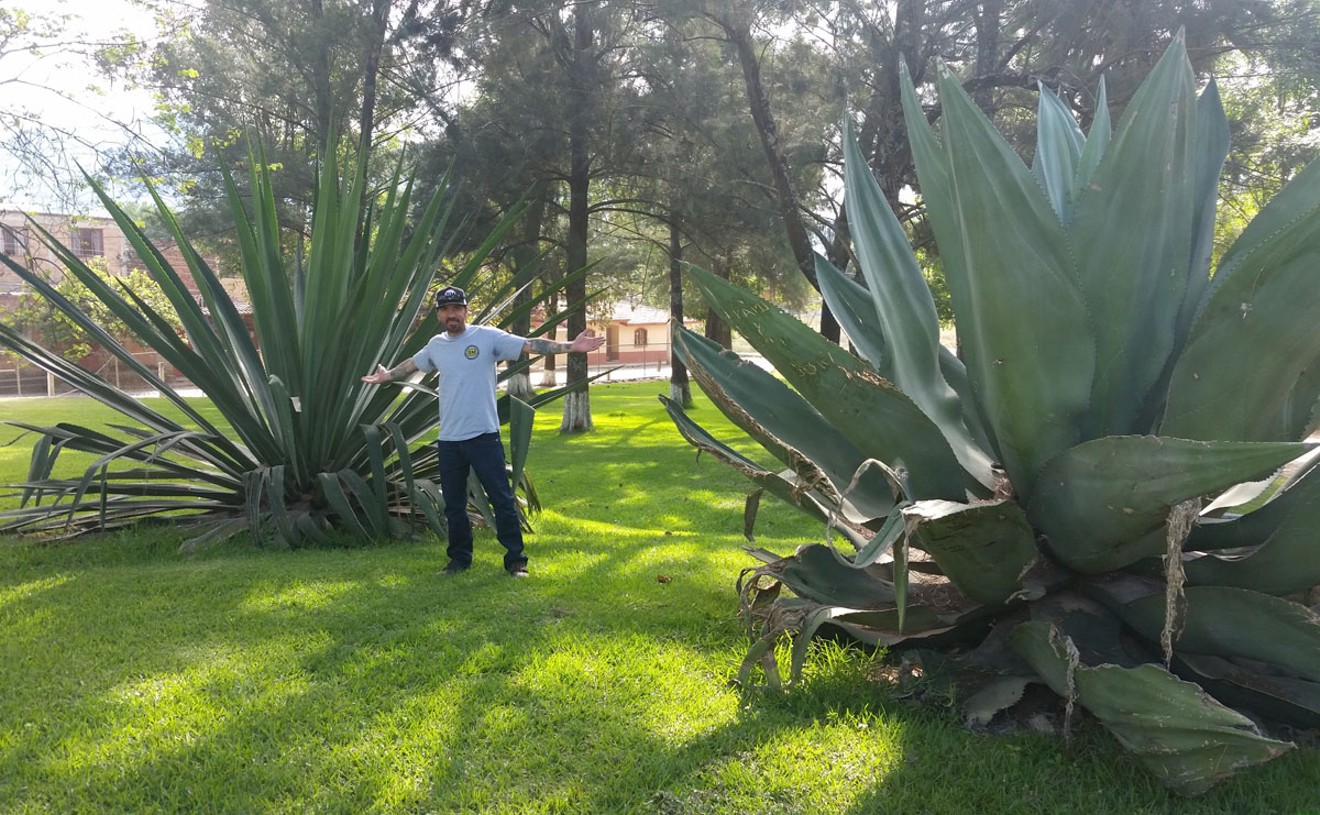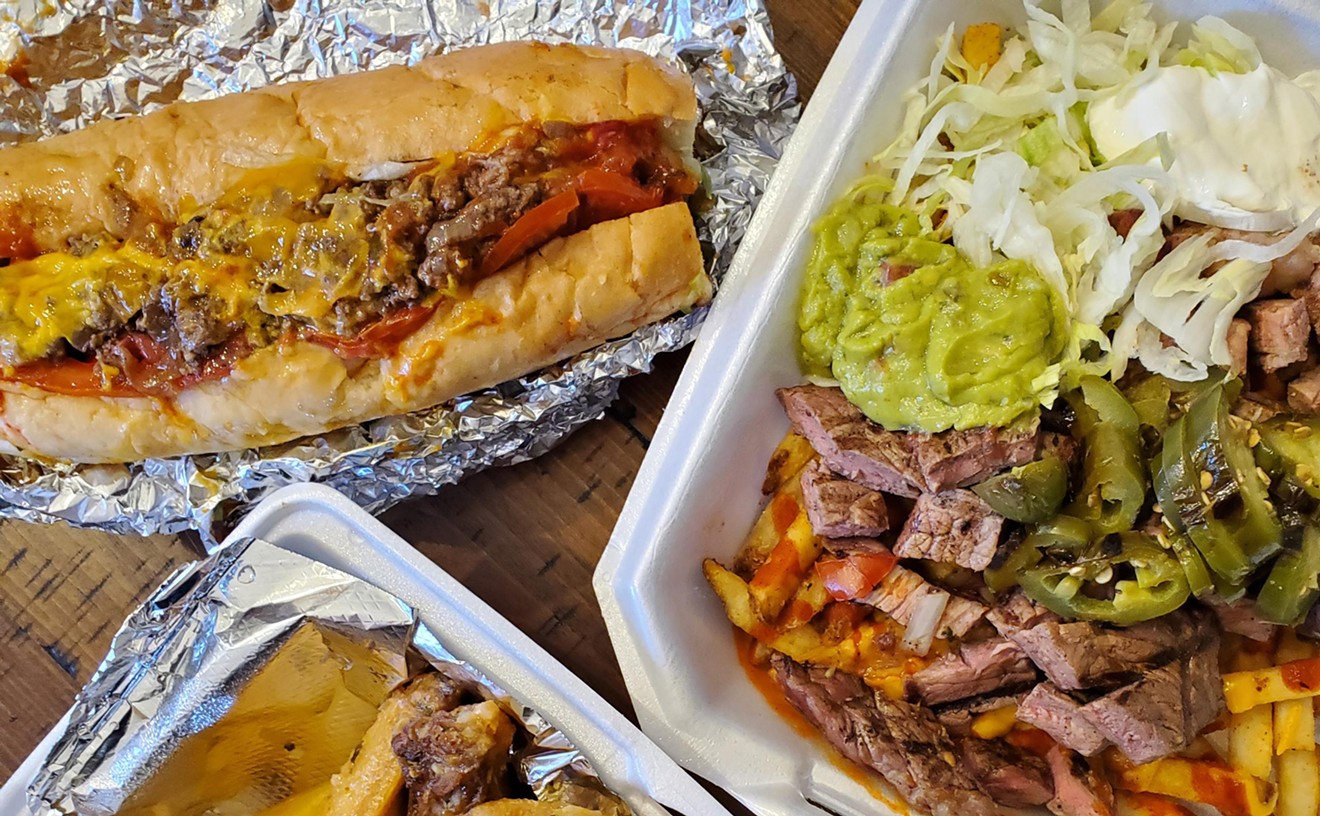Tending bar first tickled Brian Rossi’s interest in tequila, but a trip to Mexico — and then several trips after that — fueled a raging passion for all booze distilled from agave plants. Four years ago, Rossi opened Adelitas Cocina y Cantina to share that passion with the Mile High City, establishing a haven where adventurous drinkers could learn more about mezcal, tequila and other agave spirits. And last year he unveiled Palenque, his homage to Oaxacan mezcalerias, behind Adelitas on South Broadway. In both spots, he leans on chef Silvia Ayala to turn out regional Mexican specialties: Adelitas features cuisine from Michoacán, while Palenque pulls its menu from Oaxaca. We recently caught up with Rossi to chat about what it’s like to drink mezcal in Mexico, why he only carries the products of small distilleries behind the bar, and what you should look for if you want to drink great agave spirits.
Westword: You’ve established yourself as a tequila and mezcal expert here in Denver. What initially drew you to agave spirits?
Brian Rossi: Thirteen years ago, I was the general manager of Mezcal on East Colfax. Beam Global took us to Mexico, and we toured the El Tesoro and Sauza distilleries. That was my first time to Mexico. I fell in love with it, with the land and culture; it sparked my passion. I started getting into different tequilas, but at that time, there was barely any mezcal [coming into the States] — just Del Maguey and Scorpion. I went over to El Camino and kept working with tequila, then I got the opportunity to open Adelitas. I was still really tequila-minded. I started going to Tequila Fortaleza [in Mexico]; there was an add-on trip to Oaxaca. As soon as I went to Oaxaca, I was hooked — me and mezcal started our relationship, which has grown and grown.
Could you give us a quick primer on mezcal? What is essential that a drinker know?
Mezcal [is a term that encapsulates] all agave spirits. From there, you get into denomination of origin and the kind of agave. Tequila, for instance, has to come from Jalisco, Michoacán, Nayarit, Guanajuato and Tamaulipas. Mezcal [or a spirit actually labeled as mezcal] is made in Oaxaca, Durango, Guanajuato, Zacatecas, Guerrero, San Luis Potosí, Tamaulipas and Puebla. Then you have things like raicilla, which comes from Jalisco; it’s not labeled mezcal because of denomination of origin. They can do some fun things with raicilla by using any type of still and agave, and they can distill it only one time if they want. With mezcal and tequila, by law, you have to distill at least twice.
Talk a bit about the culture of tequila and mezcal distilling in Mexico.
Not all tequila companies are good companies, but the ones that I have been able to surround myself with are [run by] incredible people who preach really ethical business practices. People work hard. Mezcal used to be firewater, a poor man’s drink. Children saw their father or grandfather work their tails off, and they weren’t making any money. So people who are getting into mezcal are not helping a big corporation; they’re helping a family come back together. It’s a pride thing. This is one person, maybe two, working their tails off, sometimes 24 hours a day, sleeping on the floor of the palenque while distilling.
What should mezcal drinkers look for if they’d like to support those family businesses as opposed to big corporations?
The label tells you a lot. It should give a full disclosure, including location of the palenque, who the producer is, what type of agave, when was it distilled, maturity and, if we’re dealing with a blend, how much of each specific agave is in that bottle. Full disclosure on a label will tell you everything you need to know, and this is what will protect mezcal from [having the same issues as] tequila. Tequila has a problem with a couple different things when it comes to taking shortcuts, like breaking down agaves by hot water — instead of cooking agaves, you cook the juice, which takes three to four days out of the process. Or they’ll pull premature agaves out of the ground and not wait for them to mature. Or they’ll use additives — tequila is not supposed to taste like vanilla. If tequila makers were to disclose on their labels cooking methods and fermentation and distillation and maturity of agave, you could look at bottles on a shelf and say, “I’m not going to drink that.” Full disclosure is really big.
What were you hoping to bring to Denver with Adelitas and Palenque?
I wanted to show people what I’ve been able to learn, to educate people. Mezcalerias are an educational experience. I really wanted to bring that to Denver and see if we could re-create it. I want to support smaller, independent families putting out a natural product. Those are the things that bring up the good flavors.
How does that educational experience go when you’re drinking in Mexico?
Here’s an example. One of my first experiences in Oaxaca, I walked into a place and said, “I’d love a tepeztate.” Tepeztates are the most exotic mezcals; they take 25 to 35 years to mature. The bartender looked at me and said, “Hold on. We’re going to start you over here. We want to make you understand what goes into an espadín” — the youngest agave — “then into a tobala, which ages for fifteen years, then we’ll jump to karwinski, then we’ll go to tepeztate.” It was important to understand what goes into each of these, but he was also teaching cultivation and sustainability. Tepeztates take 35 years to age, so if we drink them all now, where are we going to be in ten years? It will take another 25 years to make more. [Mezcalerias foster] sustainability, good practices, learning about the culture, and learning about who you’re helping.
Adelitas and Palenque also gave you a chance to highlight Mexican food from regions we see less of in Denver.
Silvia Ayala, our chef, is from Michoacán. She’d never worked a day in a commercial kitchen. When I had the place for Adelitas, I found out she was looking to do a taqueria. At that time, I’d never experienced Michoacán food; when she cooked, I was blown away. I’d been working in Mexican restaurants all those years prior, but I had never experienced the flavor differences of the region. Michoacán is rich in flavors — it’s the soul food of Mexico. Then I went to Oaxaca, and I decided to do Oaxacan food going into Palenque. Oaxaca is known for its moles, and we’re doing three types of moles at Palenque.
Any other regions you’d like to see highlighted here?
The Yucatán has really great fish and seafood.
You told us recently that you’re planning to open up an ice cream shop this year. What’s the scoop (pardon that terrible pun)?
La Chupaflor will share the patio with Palenque and have a walk-up window. It’s going to be Michocacán-style ice cream, with lots of different flavors, like pistachio and queso — flavors that are not typical for an ice cream shop. Silvia will make the ice cream. If we can find a way to infuse mezcal and tequila into ice cream, we’ll do that, too. And we’ll have serving suggestions — try this ice cream and go order this tequila. We think it will really complement the neighborhood. One of my partners has three children, I have two children, and we think it will be a really good spot for our children to work.
So are you a purist when it comes to your tequila and mezcal, or do you think there’s an ideal cocktail for showcasing these spirits?
I’m a purist, but that doesn’t mean everyone should be. It’s a spirit; it’s meant to be fun. That said, we drink raicilla and Squirt with my friend Estebán in raicilla country, because that’s what they drink. Raicilla is amazing by itself, but you can only drink so much of it neat — it’s high ABV. So you mix it with Squirt and make it last all day. But for me personally, here, it’s neat only.
Acknowledging that, what makes a perfect margarita?
Very little lime juice, a little Cointreau, and the proper tequila. All-natural tequila — use a good brand. That is truly the key. How many things can you do to a traditional maragarita? It’s about the materials that go into it.
Adelitas and Palenque, 1294 South Broadway. For more information, call 303-778-1294 and 303-997-5359, or go to adelitasdenver.com.
[
{
"name": "Air - MediumRectangle - Inline Content - Mobile Display Size",
"component": "12017618",
"insertPoint": "2",
"requiredCountToDisplay": "2"
},{
"name": "Editor Picks",
"component": "17242653",
"insertPoint": "4",
"requiredCountToDisplay": "1"
},{
"name": "Inline Links",
"component": "18838239",
"insertPoint": "8th",
"startingPoint": 8,
"requiredCountToDisplay": "7",
"maxInsertions": 25
},{
"name": "Air - MediumRectangle - Combo - Inline Content",
"component": "17261320",
"insertPoint": "8th",
"startingPoint": 8,
"requiredCountToDisplay": "7",
"maxInsertions": 25
},{
"name": "Inline Links",
"component": "18838239",
"insertPoint": "8th",
"startingPoint": 12,
"requiredCountToDisplay": "11",
"maxInsertions": 25
},{
"name": "Air - Leaderboard Tower - Combo - Inline Content",
"component": "17261321",
"insertPoint": "8th",
"startingPoint": 12,
"requiredCountToDisplay": "11",
"maxInsertions": 25
}
]













